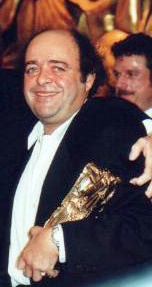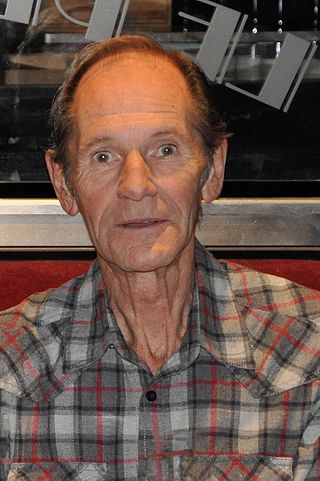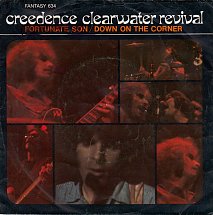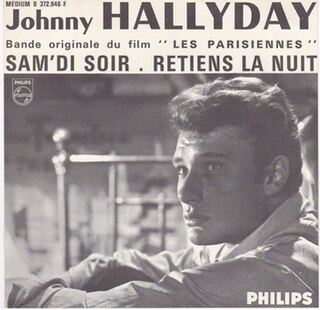Related Research Articles

Jean-Philippe Léo Smet, better known by his stage name Johnny Hallyday, was a French rock and roll and pop singer and actor, credited with having brought rock and roll to France.

Sylvie Vartan is a Bulgarian-French singer and actress. She is known as one of the most productive and tough-sounding yé-yé artists. Her performances often featured elaborate show-dance choreography, and she made many appearances on French and Italian TV.

Jacques Villeret was a French actor, best known internationally for his role as François Pignon in the comedy Le Dîner de Cons. During his career, he earned many awards including the prestigious medal and title of Chevalier de la Légion d'Honneur.

Michel Jean Hamburger, known professionally as Michel Berger, was a French singer and songwriter. He was a leading figure of France's pop music scene for two decades as a singer; as a songwriter, he was active for such artists as his wife France Gall, Françoise Hardy or Johnny Hallyday. He died of a heart attack at age 44.

Bobbie Clarke was an English rock drummer. He was regarded by critics as an important figure in the configuration of early British rock and roll, although he is often chiefly remembered for his long term association as the drummer with Vince Taylor and the Playboys.

"Fortunate Son" is a song by the American rock band Creedence Clearwater Revival, released on the band's fourth studio album, Willy and the Poor Boys in October 1969. It was previously released as a single, together with "Down on the Corner", in September 1969. It soon became a Vietnam anti-war movement anthem and an expressive symbol of the counterculture's opposition to U.S. military involvement in the Vietnam War and solidarity with the soldiers fighting it. The song has been featured extensively in pop culture depictions of the Vietnam War and the anti-war movement.

"Da Doo Ron Ron (When He Walked Me Home)" is a song written by Jeff Barry, Ellie Greenwich and Phil Spector. It first became a popular top five hit single for the American girl group the Crystals in 1963. American teen idol Shaun Cassidy recorded the song in 1977 and his version hit number one on the Billboard Hot 100 chart. There have also been many other cover versions of this song, including one by the songwriters Jeff Barry and Ellie Greenwich themselves, performing as the Raindrops.

Yves Félix Claude Boisset is a French film director and scriptwriter.
This is the discography of French rock and roll singer Johnny Hallyday.

"Les Bras en croix" is a song by French singer Johnny Hallyday, released in 1963. It was written by Jil & Jan (lyrics) and Johnny Hallyday (music).

"Retiens la nuit" is a song by French singer Johnny Hallyday from his 1961 studio album Salut les copains. It was also released as an EP in February 1962 and as a single two months prior. The song was also featured in the 1962 French comedy-drama anthology film "Les parisiennes", which starred Hallyday.

"Comme un corbeau blanc" is a song by French singer Johnny Hallyday. It was released as a single in February 1973 and included on his 1973 studio album Insolitudes.

"Comme un garçon" is a song by Sylvie Vartan from her 1967 album Comme un garçon. It was also released on an EP and as a single.

"Jésus Christ" is a song by French singer Johnny Hallyday. It was released in April 1970 and recorded the month prior. The song was controversial upon its release for its portrayal of Jesus as a Hippie. The song was written by Journalist Philippe Labro and bandleader and Hallyday's brother-in-law Eddie Vartan.

"Je ne suis pas un héros" is a song by French singer Johnny Hallyday, released on his 1980 album À partir de maintenant. It was written by fellow singer Daniel Balavoine who went on to also record and release his own version.

À tout casser is a 1968 French-Italian film, directed by American blacklisted director John Berry.
Robin Mark Le Mesurier Halliley was a British guitarist, known for his long collaborations with Rod Stewart and Johnny Hallyday, as well as for the wide-ranging nature of his musical performance, including membership of such bands as The Wombles.
Claude Desailly was a French screenwriter. He collaborated on a number of films with the director Robert Hossein. He is best known for his creation and writing of the period crime television series Les Brigades du Tigre which ran from 1974 to 1983.

"Quelque chose de Tennessee" is a 1985 song recorded by French singer Johnny Hallyday. Written and produced by Michel Berger, it was released in December 1985 as the third single from the album Rock'n'Roll Attitude, on which it appears as the third track. It is a tribute to American playwright and screenwriter Tennessee Williams, who created A Streetcar Named Desire (1947), Cat on a Hot Tin Roof (1955), Sweet Bird of Youth (1959), and The Night of the Iguana (1961), among others. The song was a top ten hit in France and became one of Hallyday's most popular songs throughout years.

"Mirador" is a 1989 ballad recorded by French singer Johnny Hallyday. Written by Étienne Roda-Gil with a music composed by Hallyday's son David Hallyday, it was the first single from his 36th studio album Cadillac, on which it appears as the second track, and was released in June 1989. It achieved success in France where it was a top three hit.
References
- ↑ Films and Filming, Volume 17, Issue 3. Hansom Books. 1971.
- ↑ Daniel Lesueur. CAMION BLANC: JOHNNY HALLYDAY Argus. CAMION BLANC. pp. 129–. ISBN 978-2-35779-639-3.
- ↑ L'Express, Issues 1317-1329. Presse-Union. 1976.
- ↑ Première, Issues 305-307. Hachette Filipacchi Associés. 2002.
- ↑ Officiel de la couture et de la mode de Paris, issues 577-578. 1970.
- ↑ Jacques Siclier (1990). Le cinéma français: De la bataille du rail à la Chinoise, 1945-1968. Ramsay. ISBN 978-2-85956-724-8.